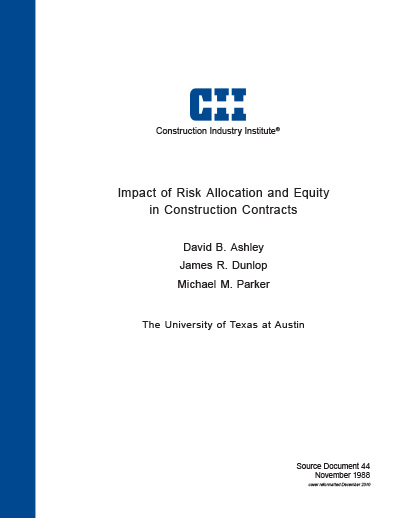
Impact of Various Construction Contract Types and Clauses on Project Performance
The Construction Industry Institute (CII) Contracts Task Force was formed to seek ways of increasing construction cost effectiveness by improving the contractual relationship of the owner and the contractor. This publication discusses studies undertaken to assess the impact on project performance of various types of contracts and commonly used contract clauses.
The database for the studies was provided by responses from 36 CII member companies to an in-depth questionnaire, with each company citing actual experiences from a recent project. Response analyses indicate that the contract clauses most frequently involved in problems and disputes are those dealing with work scope, changes, and project control.
Further analyses concluded that the choice of the type of contract (fixed cost versus cost reimbursable) should be heavily influenced by four circumstances: (1) the extent to which the work is defined (2) the desired allocation of risk between owner and contractor (3) the availability of owner expertise and effort on the project (4) the need to accommodate fast-tracking of design and construction and (5) the general marketplace conditions.
While owner and contractor responses were reasonably consistent, some significant differences were expressed about those clauses that were most troublesome, and about the risk allocation effect of particular clauses. This emphasizes the need for a thorough discussion at the outset of a project to develop a common understanding by owner and contractor representatives of the contractual obligations.
The conclusions and recommendations of this study were distilled from the judgmental views of the highly experienced task force members, based on and supported by the quantitative analysis of the questionnaire responses. They merit attention, both because they may suggest improvements that can be made now and because of their value in prioritizing further research.
The interrelated areas listed below were identified for further research because of their high potential for improving construction cost effectiveness:
- Developing a better understanding of both the options for allocating and managing risk, and the techniques for adapting this aspect of the contract to the circumstances of a particular project
- Identifying mechanisms that will serve to more closely align the objectives of owner and contractor
The nine most problematic clauses fall into three main groupings: (RS5-1, p. 4)
- Work Scope Clauses – issues involve errors, omissions, ambiguities, and inconsistencies
- Change Clauses – issues involve definitions, dispute resolution, negotiation of costs, and approval timeline
- Project Controls Clauses – issues involve mechanisms to monitor and approve project performance
The type of contract (fixed-cost vs. cost-reimbursable) should be heavily influenced by five factors: (RS5-1, p. 10)
- The extent to which the work is defined
- The desired allocation of risk between owner and contractor
- The availability of owner expertise and effort on the project
- The need to accommodate fast-tracking of design and construction
- The general marketplace conditions



